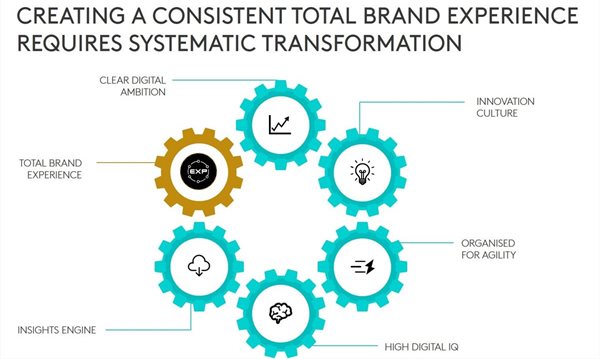As companies define their future-fit commercial strategies, they also need to challenge some of their widely held assumptions related to the evolving digital retail landscape. Here's why...

Credit: Getty
The rise of technology has helped shape a new generation of consumers that is more informed, and more powerful, than ever.
The rate of change is perfectly summed up in this quote: “10 years of online channel growth, achieved in 2 to 3 months as a result of Covid-19.” – Kantar, Worldpanel UK, 2020
The rise of digital commerce has been a defining feature of the last decade. Since smartphones began serving as magical portals to digital realms, we have seen the emergence of new roles, new business units and entirely new businesses capitalising on the commercial potential of the new cyberspace in which people were increasingly spending their time.
Then the pandemic hit and the retail landscape had to evolve even more dramatically, accelerated by this period of disruption which thrust the world as we knew it into virtual cocoons, intensifying our reliance on digital infrastructure and delivery services.
As we journey deeper into the next decade, we will see many of the widely held assumptions related to digital commerce challenged and upended – to quote the oft-quoted modern business management consultant Peter Drucker, “the greatest danger in times of turbulence is to act with yesterday’s logic”.
Designing future-fit commercial strategies may therefore require reframing and updating our understanding of three critical concepts, so as not to fall victim to “yesterday’s logic”:
1. Redefining digital as ambient
The recent World Economic Forum agenda stated that “3G and 4G were designed to put the world in the palm of our hand… 5G is designed to take our hand out of the equation”. While digital has long been understood as another space, separate to our physical existence, that line between ‘digital’ and physical disappears completely when we look to the future.
The Spatial Web will coat our physical environments with invisible layers of intelligence, and tangible, physical things will be recreated in virtual spaces, all without conscious engagement with handheld or wearable devices.
2. Redefining retail as a service
The evolution of ambient digital intelligence implies that any and every space, whether physical or digital, has commercial potential in 2030. Firstly, this calls for us to re-evaluate the role of physical space in retail, which should increasingly serve as a point of contact, fulfilling social and emotional expectations – not just a functional point of sale.
Secondly, when every space has commercial potential, it is the job of marketers and retailers to work together to optimise and ease the path to purchase, which might mean enabling access to new kinds of marketplace, new payment or ownership and partnership models, or even authenticating transactions.
Retail is about service provision in 2030, not just sales.
Meghan Taylor 25 Nov 2020 3. Redefining consumer and shopper as citizens
Even the labels of ‘consumer and shopper’ (which imply passively receiving, and unknowingly assuming responsibility for the outputs of a linear supply chain) are becoming outdated.
Ubiquitous connectivity, transformed social values and regulatory pushes flatten the information landscape and democratise access to the marketplace. We can therefore anticipate a 2030 in which individuals are ‘nested’ within human-centric ecosystems and ‘closed loop’ supply chains, in which people contribute as much as they consume, and in which value exchanges are better understood.
ecommerce.co.za
1 Mar 2021Big tech players are the frontrunners in serving citizens, not consumers – they invest heavily in understanding people based on their interactions with their community and the world, not just through their purchase histories. Digital citizenships (i.e. subscribing to Apple or Amazon or WeChat’s constellation of services in exchange for data and fees) are fast becoming more influential in our daily lives than our national citizenships. It’s not hard to imagine a future in which those subscriptions provide us with more personal value.
In order to deliver a total brand experience consistently, a business needs to undergo systematic transformation to become more agile and always put humans at the heart of decision-making. Here’s a view that will help you see the systemic transformation required.

Credit: Kantar
These terms, which almost all of us use multiple times in our working day – digital, retail, and consumer – are packed with assumptions that limit our ability to consider more holistic, more nuanced and more honest futures. They serve as ambient digital wrappers around our societies and spaces that will allow for smarter ecosystems of service provision.
Advanced digital infrastructure will therefore make any space a commercial opportunity for established brands – but also for people, who will be making, marketing, selling, and sharing in myriad ways.
Designing commercial strategies fit for 2030 or indeed 2021, therefore, requires this critical reframing of digital as ambient, retail as a service, and consumers as citizens.
Then there’s the ‘so what?’ of this digital future. What does this mean for our business strategies and how we are integrated internally and finally, how do we go to market in leveraging a more digitally savvy world for sustainable growth?
Here’s an example that should be easy to identify with: Microsoft Teams has to be the game-changer of our modern lives, from office meetings and online schooling to family celebrations, and now even coffee apps. This is a cool example of how digital has connected the basic of human interactions across our total lifestyle. Everybody has been included, from children to grandparents.
These are the critical strategic questions we need to tackle today in order to formulate a fresh, future-focused strategy that maximises the strengths of today’s digital era for long-term business growth.
The inaugural E-commerce Day launches on 10 March 2021, with a special editorial focus on Bizcommunity for the week. E-commerce Day is an initiative by ecommerce.co.za.











































